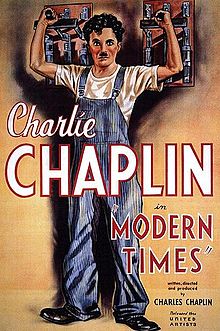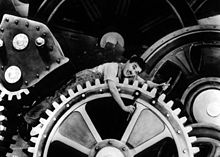- Modern Times (film)
-
Modern Times 
Directed by Charlie Chaplin Produced by Charlie Chaplin Written by Charlie Chaplin
Paulette Goddard (uncredited)Starring Charlie Chaplin
Paulette Goddard
Henry Bergman
Stanley Sandford
Chester ConklinMusic by Charlie Chaplin Cinematography Ira H. Morgan
Roland TotherohEditing by Williard Nico Distributed by United Artists (1930s-2003) MK2 Editions (2003-2010) Janus Films/Criterion (2010-present) Release date(s) February 5, 1936 Running time 87 minutes Language English Budget $1,500,000 (est.) Box office $8.5 Million Modern Times is a 1936 comedy film by Charlie Chaplin that has his iconic Little Tramp character struggling to survive in the modern, industrialized world. The film is a comment on the desperate employment and fiscal conditions many people faced during the Great Depression, conditions created, in Chaplin's view, by the efficiencies of modern industrialization. The movie stars Chaplin, Paulette Goddard, Henry Bergman, Stanley Sandford and Chester Conklin, and was written and directed by Chaplin.
Modern Times was deemed "culturally significant" by the Library of Congress in 1989, and selected for preservation in the United States National Film Registry. Fourteen years later, it was screened "out of competition" at the 2003 Cannes Film Festival.[1]
Contents
Plot
Modern Times portrays Chaplin as a factory worker, employed on an assembly line. After being subjected to such indignities as being force-fed by a "modern" feeding machine and an accelerating assembly line where Chaplin screws nuts at an ever-increasing rate onto pieces of machinery, he suffers a mental breakdown that causes him to run amok throwing the factory into chaos. Chaplin is sent to a hospital. Following his recovery the now unemployed Chaplin is arrested as an instigator in a Communist demonstration since he was waving a red flag that fell off a delivery truck (Chaplin intended to return the flag to the driver). In jail, he accidentally eats smuggled cocaine, mistaking it for salt. In his subsequent delirious state he walks into a jailbreak and knocks out the convicts. He is hailed a hero and is released.
Outside the jail, he discovers life is harsh, and attempts to get arrested after failing to get a decent job. He soon runs into an orphan and gamine girl, played by Paulette Goddard, who is fleeing the police after stealing a loaf of bread. To save the girl he tells police that he is the thief and ought to be arrested. However, a witness reveals his deception and he is freed. To get arrested again, he eats an enormous amount of food at a cafeteria without paying. He meets up with the gamine in the paddy wagon, which crashes, and the girl convinces the reluctant Chaplin to escape with her. Dreaming of a better life, he gets a job as a night watchman at a department store, sneaks the gamine into the store and even lets burglars have some food. Waking up the next morning in a pile of clothes, he is arrested once more.
Ten days later, the gamine takes him to a new home—a run-down shack that she admits "isn't Buckingham Palace" but will do. The next morning, Chaplin reads about a new factory and lands a job there. He gets his boss trapped in machinery, but manages to extricate him. The other workers decide to go on strike. Accidentally paddling a brick into a policeman, he is arrested again. Two weeks later, he is released and learns that the gamine is a café dancer. She tries to get him a job as a singer. By night, he becomes an efficient waiter though he finds it difficult to tell the difference between the "in" and "out" doors to the kitchen, or to successfully deliver a roast duck to table through a busy dance floor. During his floor show, he loses a cuff that bears the lyrics of his song, but he rescues his act by improvising the story using an amalgam of word play, words in (or made up of word parts from) multiple languages and mock sentence structure while pantomiming. His act proves a hit. When police arrive to arrest the gamine for her earlier escape, they escape again. Finally, we see them walking down a road at dawn, towards an uncertain but hopeful future.
Production
- Director: Charles Chaplin
- Producer: Charles Chaplin
- Screenwriter: Charles Chaplin
- Director of Photography: Roland Totheroh
Chaplin began preparing the film in 1934 as his first "talkie", and went as far as writing a dialogue script and experimenting with some sound scenes. However, he soon abandoned these attempts and reverted to a silent format with synchronized sound effects. The dialogue experiments confirmed his long-standing conviction that the universal appeal of the Tramp would be lost if the character ever spoke on screen. Most of the film was shot at "silent speed", 18 frames per second, which when projected at "sound speed", 24 frames per second, makes the slapstick action appear even more frenetic. Available prints of the film now correct this. The duration of filming was long, beginning on October 11, 1934 and ending on August 30, 1935.[2]
The reference to drugs seen in the prison sequence is somewhat daring for the time (since the production code, established in 1930, forbade the depiction of illegal drug use in films); Chaplin had made drug references before in one of his most famous short films Easy Street, released in 1917.
Music
According to the official documents, the music score was composed by Chaplin himself, and arranged with the assistance of Alfred Newman. The romance theme was later given lyrics, and became the pop standard "Smile", first recorded by Nat King Cole and later covered by artists as Sammy Davis Jr., Dean Martin, Trini Lopez, Eric Clapton, Barbra Streisand, Diana Ross, Michael Bublé, Petula Clark, Liberace, Judy Garland, Madeleine Peyroux, Michael Jackson and Robert Downey, Jr. (included on the soundtrack for the film Chaplin).
Modern Times was the first film where Chaplin's voice is heard as he performs Léo Daniderff's comical song Je cherche après Titine. Chaplin's version is also known as The Nonsense Song, as his character has to sing it in gibberish (due to losing the shirt cuff on which the lyrics were written, and thus having to make up the lyrics on the spot). The lyrics are nonsensical but appear to contain words from French and Italian; the use of deliberately half-intelligible wording for comic effect points the way towards Hynkel's speeches in The Great Dictator.
According to film composer David Raksin, the music was written by him as a young man wanting to make a name for himself. Chaplin would sit, often in the washroom, humming tunes and telling Raksin to "take this down". Raksin's job was to turn the humming into a score and create timings and synchronization that fit the situations. Chaplin was a violinist and had some musical knowledge, but he was not an orchestrator and was unfamiliar with synchronization. Raksin later created scores for such films as Laura and The Day After.
Reception
Modern Times is often hailed as one of Chaplin's greatest achievements, and it remains one of his most popular films. French philosophers Jean-Paul Sartre, Simone de Beauvoir and Maurice Merlau-Ponty named their journal, Les Temps Modernes, after it.[3] The iconic depiction of Chaplin working frantically to keep up with an assembly line inspired later comedy routines including Disney's Der Fuehrer's Face (Donald Duck alternately assembling artillery shells and saluting portraits of Adolf Hitler) and an episode of I Love Lucy titled "Job Switching" (Lucy and Ethel trying to keep up with an ever-increasing volume of chocolate candies, eventually stuffing them in their mouths, hats, and blouses). This was Chaplin's first overtly political-themed film, and its unflattering portrayal of industrial society generated controversy in some quarters upon its initial release.
The film exhibits notable similarities to a 1931 French film directed by René Clair entitled À nous la liberté (Liberty for Us) — the assembly line sequence is a clear instance. The German film company Tobis Film sued Chaplin following the film's release to no avail. They sued again[citation needed] after World War II (considered revenge for Chaplin's later anti-Nazi statements in The Great Dictator). This time, they settled with Chaplin out of court. À nous la liberté director Clair was an outspoken admirer of Chaplin, was flattered by the notion that the film icon might imitate him, deeply embarrassed that Tobis Film would sue Chaplin and was never part of the case.
The film did attract criticism for being almost completely silent, despite the movie industry having long since embraced the talking picture. Chaplin famously feared that the mystery and romanticism of the tramp character would be ruined if he spoke, and feared it would alienate his fans in non-English speaking territories. His future films, however, would be fully fledged "talkies" – although without the character of the Little Tramp.
American Film Institute recognition
- 1998 AFI's 100 Years... 100 Movies #81
- 2000 AFI's 100 Years... 100 Laughs #33
- 2007 AFI's 100 Years... 100 Movies (10th Anniversary Edition) #78
See also
References
- ^ "Festival de Cannes: Modern Times". festival-cannes.com. http://www.festival-cannes.com/en/archives/ficheFilm/id/4075172/year/2003.html. Retrieved November 8, 2009.
- ^ As said in "Chaplin Today: Modern Times", a 2003 French documentary.
- ^ Appignanesi, Lisa, 2005, Simone de Beauvoir, London: Haus, ISBN 1-904950-09-4, p. 82.
External links
- Modern Times at the Internet Movie Database
- Modern Times (film) at Rotten Tomatoes
- Modern Times at the TCM Movie Database
- Modern Times at AllRovi
- Filmsite Modern Times page
- Movie stills and bibliography
AFI's 100 Years...100 Laughs 1–10 11–20 The Producers • A Night at the Opera • Young Frankenstein • Bringing Up Baby • The Philadelphia Story • Singin' in the Rain • The Odd Couple • The General • His Girl Friday • The Apartment
21–30 31–40 Raising Arizona • The Thin Man • Modern Times • Groundhog Day • Harvey • National Lampoon's Animal House • The Great Dictator • City Lights • Sullivan's Travels • It's a Mad, Mad, Mad, Mad World
41–50 51–60 61–70 What's Up, Doc? • Sherlock, Jr. • Beverly Hills Cop • Broadcast News • Horse Feathers • Take the Money and Run • Mrs. Doubtfire • The Awful Truth • Bananas • Mr. Deeds Goes to Town
71–80 Caddyshack • Mr. Blandings Builds His Dream House • Monkey Business • Nine to Five • She Done Him Wrong • Victor Victoria • The Palm Beach Story • Road to Morocco • The Freshman • Sleeper
81–90 91–100 The Heartbreak Kid • Ball of Fire • Fargo • Auntie Mame • Silver Streak • Sons of the Desert • Bull Durham • The Court Jester • The Nutty Professor • Good Morning, Vietnam
Categories:- English-language films
- 1936 films
- Black-and-white films
- Films directed by Charlie Chaplin
- 1930s romantic comedy films
- American satirical films
- United Artists films
- United States National Film Registry films
- Fictional-language films
- American romantic comedy films
- Great Depression films
- Roller skating films
Wikimedia Foundation. 2010.


